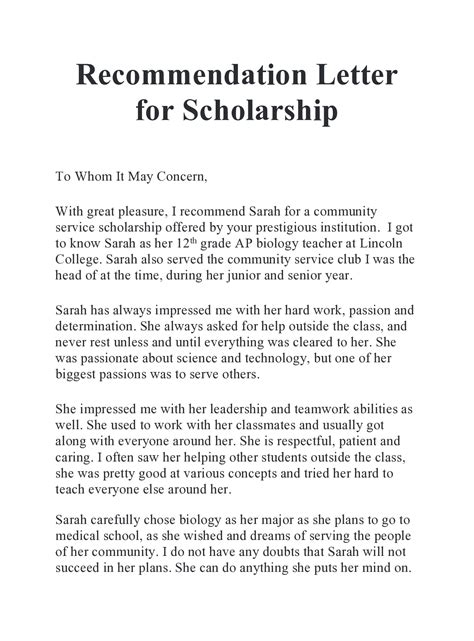Unlock Your Scholarship Success with Stellar reference letters

When applying for scholarships, strong reference letters hold the power to elevate your application and increase your chances of securing financial support. To ensure that your letters effectively showcase your strengths and qualifications, follow these essential steps:
1. Identify Your Ideal Reference Writers
Key Pain Point: Identifying the right people to write your letters can be a daunting task.
Solution: Strategically select individuals who can provide compelling endorsements of your academic abilities, character, and involvement. Consider:
- Professors who have taught you in advanced or specialized courses
- Advisors who have witnessed your growth and potential
- Supervisors who have firsthand experience with your work ethic and leadership skills
2. Request Letters with a Clear Plan
Key Pain Point: Without clear communication, reference writers may not have a comprehensive understanding of your application goals and expectations.
Solution: Provide your references with the following information:
- A copy of your scholarship application or a summary of your qualifications
- Clear instructions on the specific areas you want them to highlight in their letters
- A deadline for submitting the letters
3. Provide Supporting Materials
Key Pain Point: Reference writers may need additional information to effectively support your application.
Solution: Offer to provide your references with:
- Your transcript or resume
- Copies of research papers or projects
- Letters of recommendation you have received in the past
4. Draft an Outline to Guide Your Writers
Key Pain Point: Reference writers may appreciate guidance to ensure their letters align with your application goals.
Solution: Consider providing your references with an outline that includes:
- A brief overview of your qualifications
- Key experiences you want them to emphasize
- Specific examples that demonstrate your achievements
5. Proofread Carefully Before Submitting
Key Pain Point: Errors and inaccuracies in reference letters can undermine your application.
Solution: Once your references have completed their letters, request a copy for thorough proofreading. Check for:
- Grammatical and spelling errors
- Factual accuracy
- Consistency with your scholarship application
6. Express Gratitude and Appreciation
Key Pain Point: Showing appreciation for your reference writers demonstrates your professionalism and consideration.
Solution: Send a sincere thank-you note to your references expressing your gratitude for their support and acknowledging the importance of their letters in your scholarship application.
7. Utilize ‘Sparkle Letters’ for Maximum Impact
Key Concept: “Sparkle Letters” are reference letters that go beyond standard expectations by showcasing your exceptional qualities and making you stand out from other applicants.
Solution: Encourage your reference writers to provide specific examples of your contributions, innovative ideas, and achievements to paint a vivid and unforgettable picture of your strengths.
8. Address Committee Bias in Your Letters
Key Pain Point: Scholarship committees may have unconscious biases that can impact their evaluations.
Solution: Encourage your reference writers to actively address potential biases by highlighting your accomplishments in an inclusive and equitable manner. Use neutral language, focus on your skills and achievements, and avoid references to personal characteristics that may trigger biases.
9. Leverage the ‘Gift-in-Kind’ Principle
Key Concept: The “Gift-in-Kind” principle suggests that unpaid favors are perceived as more valuable than paid services.
Solution: Express your gratitude to your reference writers by offering small tokens of appreciation, such as a gift card or a personalized note. This gesture reinforces their willingness to support your endeavors and demonstrates your appreciation for their valuable time.
Table of ‘Sparkle Letter’ Examples
| Area of Highlight | Specific Example |
|---|---|
| Academic Excellence | “In my Advanced Calculus course, [Student’s Name] consistently exceeded expectations, achieving a perfect score on several exams. Their deep understanding of mathematical concepts and analytical problem-solving skills were truly exceptional.” |
| Research Aptitude | “During [Student’s Name]’s undergraduate research project, they developed an innovative algorithm that significantly improved the efficiency of our research team. Their independent thinking and ability to execute complex research tasks were highly commendable.” |
| Leadership and Initiative | “As President of the STEM Club, [Student’s Name] organized a record-breaking STEM outreach event for underprivileged students. Their passion for inspiring future scientists and engineers was evident in their tireless efforts and inspiring leadership.” |
| Community Involvement | “In addition to excelling academically, [Student’s Name] is an active and compassionate member of our community. They volunteer countless hours at a local soup kitchen and spearhead initiatives to support homeless families.” |
